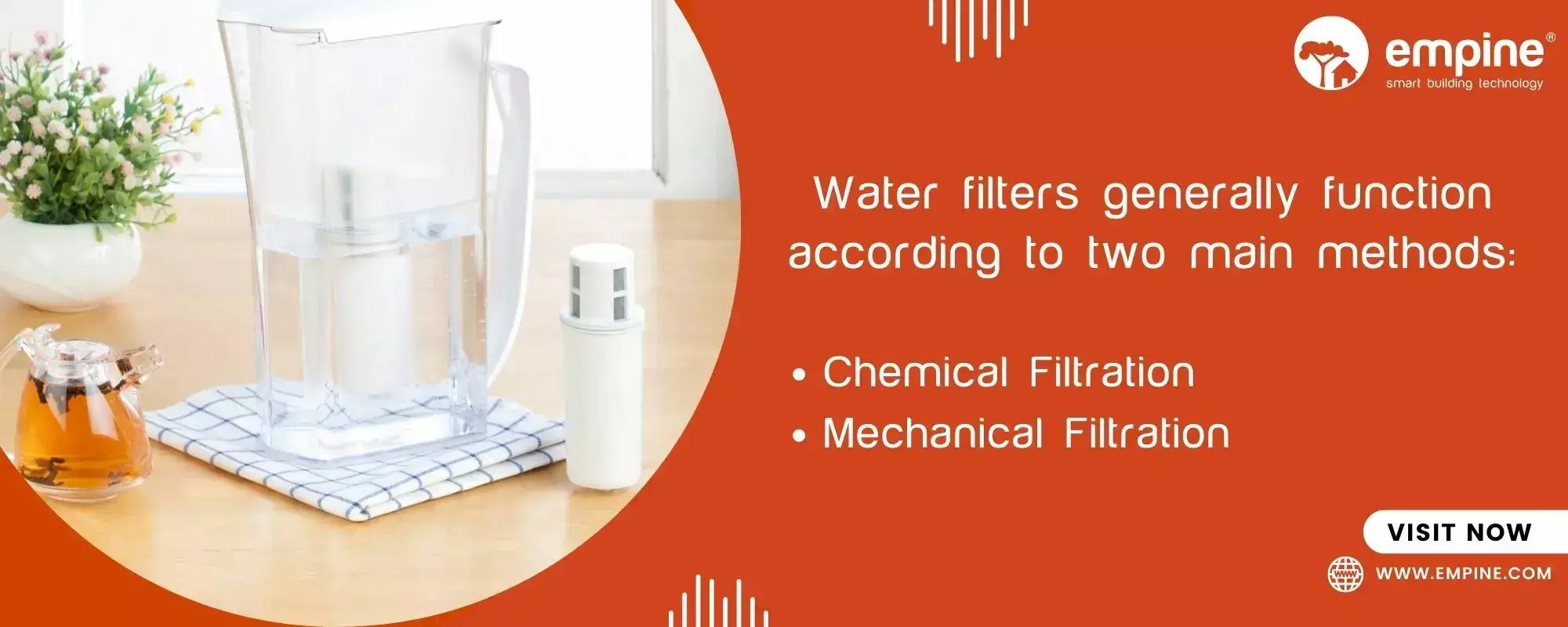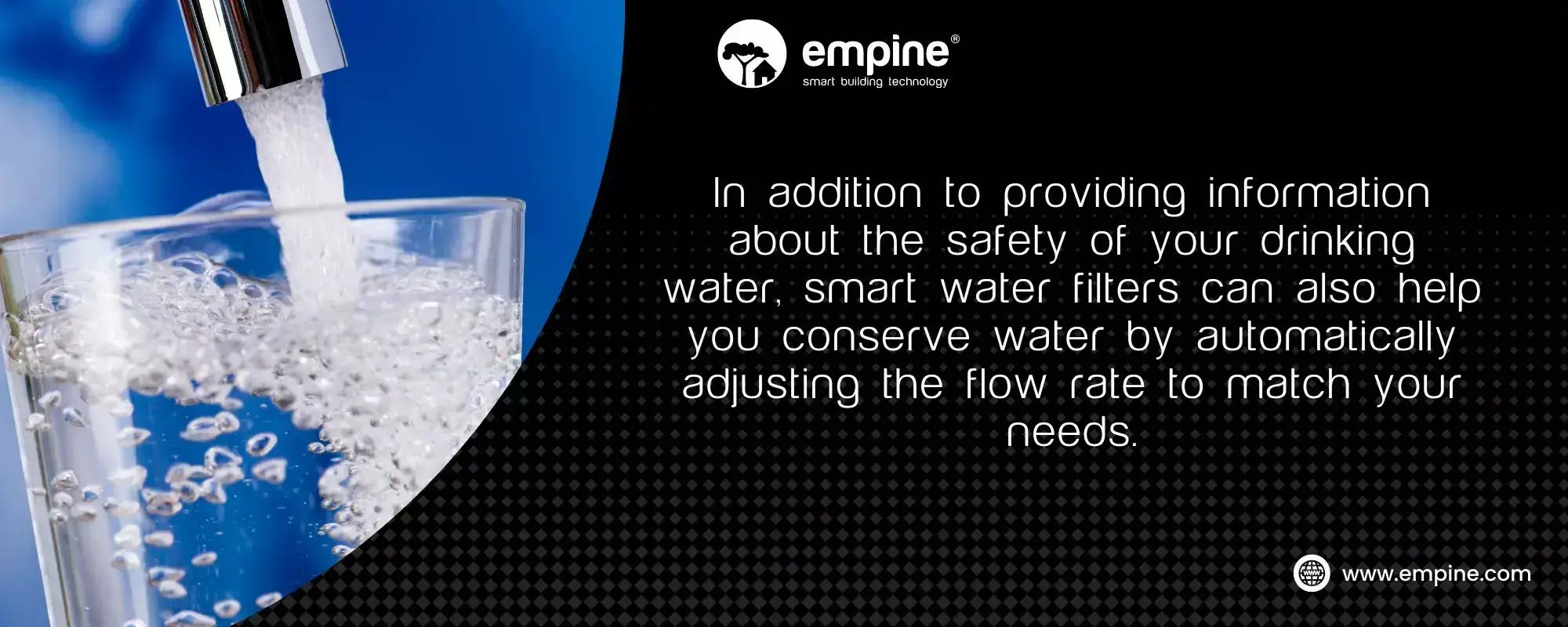We all know that clean water is essential for our health and survival, and we must have access to clean drinking water. But what happens when our municipal water supply isn’t safe? You need a water filter if you just want to ensure your family’s drinking water is as safe as possible. But with so many different types of water filters on the market, it can be tough to choose the right one.
In this blog post, we’ll break them down briefly so that you can make an informed decision about which one is best for you and your family. We’ll also discuss how they work and why smart water filters are the future.
So, keep reading, whether you’re looking to buy your first water filter or are just curious about what’s out there!
How Water Filters Work To Filter Out Contaminants
Most people are not aware of the many contaminants that can be found in water. Even tap water, which is treated with chemicals, can contain harmful bacteria and other impurities. This is why it is so important to filter your water before drinking it.
Various water filters are available on the market, and they all work to achieve a common goal: improving water quality.
There are two main methods by which most types of water filters work. These are then subdivided into specific methods like reverse osmosis, chlorination, distillation, etc.
· Mechanical Filtration
· Chemical Filtration
Mechanical filters work by physically trapping contaminants in the filter media. This can effectively remove particulate matter, such as dirt and sediment.
The size of the pores in the filter will determine which contaminants are removed and which ones pass through. For example, a filter with small pores can remove bacteria and viruses, while a filter with larger pores can remove dirt and sediment.
On the other hand, chemical filters use chemicals to adsorb or neutralize contaminants. Activated carbon is a common type of chemical filter that is effective at removing organic pollutants, such as chlorine and chloramine.
This type of filtration is often used in conjunction with physical filtration to provide the highest level of contaminant removal.

Here Are the Types of Water Filters for Your Home
Do you know what’s in your tap water? Unless you have a water filtration system installed in your home, the answer is probably “I don’t know” or “doesn’t matter.” Given how fast water pollution is becoming common, little knowledge about that fact can prove dangerous.
But don’t worry. You can avoid the hazardous risks of contaminated water with your preferred types of water filters. There are many types of water filters on the market, each with its own advantages and disadvantages.
Depending on your needs, you may want to choose a whole house water filtration system, a pitcher filter, or a faucet-mounted filter.
Let’s go.
1. Whole House Water Filter
Whole house water filtration systems are the most expensive option, but they also provide the most comprehensive filtering. These systems connect to the main water supply line and filter all water throughout the house, including from faucets, showers, washing machines, and dishwashers.
This type of system provides filtered water to every tap in the house, so you never have to worry about whether or not the water is clean.
The downside of whole house systems is that they are usually more expensive and require professional installation and regular maintenance.
2. Reverse Osmosis Filter
A reverse osmosis filtration system is a popular choice for many homeowners. This system filters water through a very fine membrane to remove any harmful residue or contaminants. As a result, it can provide water quality that is comparable to bottled water.
If you are concerned about specific contaminants, such as lead or mercury, you may want to choose a reverse osmosis system that includes an activated carbon filter. This type of filter effectively removes a wide range of contaminants from your water supply.
Reverse osmosis systems are generally very effective at removing contaminants from water, including dissolved minerals, bacteria, viruses, and even some pesticides and herbicides. However, they are imperfect, and some contaminants can slip through the semipermeable membrane.
In addition, reverse osmosis systems require regular maintenance, including replacing the filters and membranes. As a result, they can be pretty expensive to operate over time.
3. Under Sink Water Filter
Under sink water filters are a great way to ensure that the water you and your family use is clean and pollution free. Installing a filter is simple; it only takes a few minutes to set up. Once the filter is in place, all of the water that flows through your tap will be filtered, removing contaminants and impurities.
In addition to providing clean drinking water, under sink filters can also help to extend the life of your plumbing by protecting pipes from corrosion. Over time, dirt and sediment buildup can damage pipes and lead to leaks.
By filtering out these contaminants before they reach your faucets, an under sink water filter can help to keep your plumbing in good condition.
4. Countertop Water Filter
Looking for a way to filter your water without installing a new plumbing system? If so, then a countertop water filter might be the perfect solution for you. These filters screw onto your faucet, allowing you to quickly and easily filter large amounts of water.
Plus, they are an excellent choice for people who rent their homes, as they can be easily installed and removed when it’s time to move.
They are usually very affordable and can be found at most home improvement stores. So if you’re looking for an easy and affordable way to get clean, filtered water, then a countertop water filter is a great option.
5. Faucet Water Filter
Faucet water filters are a convenient and cost-effective way to improve tap water quality. They attach directly to your faucet, treating the water as it passes through. They work by trapping impurities as the water passes through the filter, leaving you with clean, refreshing, filtered water available for drinking, cooking, and washing – all from the same faucet.
Faucet filters typically last for around 3-4 months, with a filter life of about 500 gallons, before they need to be replaced, and they are easy to install and maintain.
6. Water Filter Pitcher
Water filter pitchers are an easy and effective way to remove contaminants from your water. Most water filter pitchers use a carbon filter, effectively reducing contaminants, including lead, chlorine, and bacteria.
Water filter pitchers come in various sizes, so you can choose one that meets your needs. For example, if you have a large family or drink a lot of water, you might want to choose a pitcher that holds a gallon of water.
Whatever size you choose, a water filter pitcher is an affordable way to enjoy clean, healthy water.
7. Shower Water Filter
If you’re looking for a way to improve the quality of your shower water, consider installing a shower filter. Shower filters reduce chlorine, bacteria, and fungus in the water, making it safer and more pleasant to shower in.
Shower filters can also help to improve the look and feel of your skin and hair by reducing the number of harmful chemicals that come into contact with them.
In addition, shower filters can also help to save money by prolonging the life of your shower head. By preventing mineral deposits from clogging the spray holes, shower filters help to keep your shower head functioning like new.
As a result, investing in a quality shower filter is an investment that is sure to pay off.
8. Refrigerator Water Filter
Refrigerator water filters are an important part of keeping your fridge clean and ensuring that the water dispensed is safe to drink. The filter helps to remove impurities from the water, including chlorine, lead, and other contaminants.
As a result, you can be confident that the ice cubes in your fridge are clean and free of harmful chemicals. In addition, the filtered water can also help extend your fridge's life by preventing the buildup of deposits on the ice maker and the in-door water dispenser.
9. Portable Water Filter
Portable water filters have been gaining popularity in recent years. These types can be used during travel or for emergency preparedness, but they’re usually small and lightweight, so you’ll have no problem moving them with your camping supplies if needed!
Some models use a combination of ceramic/activated charcoal media to remove both taste & odor and chemical contaminants and bacteria. Unfortunately, these same qualities make it less effective at handling viruses much smaller than bacteria.
There’s another downside here - these portable filtration devices aren’t designed specifically as everyday use tools. Depending on the usage frequency, the cartridges will need replacing every few days/ weeks.

What Are Smart Water Filters & How Do They Work?
Smart water filters are an increasingly popular option for improving their home’s water quality. But what exactly are they, and how do they work?
Smart water filters are usually connected to your home’s main water line, and they work by using various filtration methods to remove impurities from your water. Smart water filters use an array of sensors to monitor water quality and provide real-time information about the safety of your drinking water.
The sensors in a smart water filter can detect a wide range of contaminants, including bacteria, viruses, and chemicals. When a contaminant is detected, the smart water filter will automatically begin the filtration process, removing the contaminant from the water before it reaches your tap.
In addition to providing information about the safety of your drinking water, smart water filters can also help you conserve water by automatically adjusting the flow rate to match your needs.
For example, if you only need a small amount of filtered water for cooking, the smart water filter will reduce the flow rate to save water.
One of the major drawbacks of a smart water filter is its higher price tag than other conventional filtration systems.
So if you’re considering a smart water filter for your home, it’s important to research to find the right model for your needs. You’ll need to consider several different factors, such as the size of your home, the type of water you have, and your budget.
Once you have all this information, you’ll be able to find the perfect smart water filter for your home.
Conclusion
So, which types of water filters are the best for you and your family? It depends on your needs and budget. Hopefully this guide has helped you narrow down your choices and give you a little more information to make an informed decision.
Do some additional research, read reviews, and ask questions before purchasing a water filter – you want to be sure that you’re getting the right one for your home.
empine – The Leading Company for Improving Your Water Quality
You want to improve your water quality at home but are unsure where to start.
Most people don’t even realize how important it is to have clean and safe water in their homes until they start experiencing problems. Maybe you’ve been dealing with skin irritation, dry hair, or just a general feeling of being unwell.
empine has the perfect solution for you!
We offer high-tech water treatment and filtration systems that provide perfect quality water for your family. Our advanced treatment process softens the water and removes up to 32 identifiable organic contaminants like pesticides, herbicides, and microplastics to guarantee safety from harmful pollutants in our tap water.
Our smart water meters and smart water filtration systems make it easy to monitor and filter your water from the comfort of your home.
So why wait? Give us a call today and see how we can help you improve your water quality and learn more about our products and services.